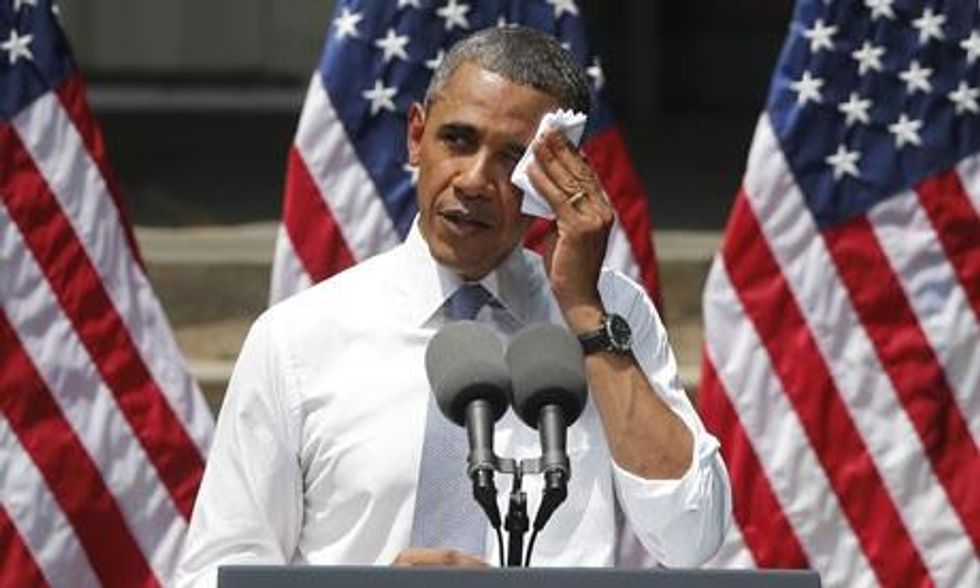Two degrees doesn't seem like much, but it takes only a few Google searches to connect the dots between the one degree of warming that has already set in, and catastrophic events like Hurricane Sandy, unprecedented wildfires in the American west and record flooding in places like the Philippines and Pakistan. Some have even pointed to extended climate-induced drought in Syria as a key driver of the conflict there. It doesn't take much sleuthing, either, to find out that humans have loaded so much carbon into the atmosphere by burning fossil fuels, cutting down forests and engaging in poor agricultural practices, that the IPCC says it's now 95% certain that we're responsible for most of the warming that has happened since the industrial revolution.
Despite decades of science showing human impact on the atmosphere, and the availability of renewable energy options, from cheap solar to wind to geothermal, political will to deal with climate change in the world's richest countries has flatlined. Last year, members of US Congress received more than $34m from oil, gas and coal companies - money to ensure they do nothing on climate change - and President Obama has so far taken baby steps compared to the enormity of the climate challenge. Despite historic investments in in clean energy, moves to raise auto fuel efficiency and regulate dirty coal plants, and hopeful signs that he's ready to engage obstructionists, President Obama has not taken the United States far enough, fast enough.
In a recent address on climate change - his first since he came into office five years ago - President Obama set a high bar for the construction of the Keystone XL tar sands pipeline, an export pipeline that would run from Canada to the Gulf Coast. He said he would approve construction only if it "does not significantly exacerbate the problem of carbon pollution". A recent independent analysis of Keystone XL (pdf) calculates that the pipeline would dump the equivalent of 51 coal power plants, or 37m cars worth of CO2 into the atmosphere per year. That's a lot of carbon. If President Obama spoke in good faith, then there is only one decision he can make: reject the pipeline.
President Obama's decision on the Keystone XL pipeline is critically important, not just because it would prevent millions of tons of carbon from spewing into the atmosphere. It would also show that he's taken responsibility for the future, taken away the right of a handful of oil, gas and coal companies to decide the destiny of our planet. It would represent a significant precedent for industrial projects; judging their worthiness on climate grounds and telling the CEOs of Exxon and Chevron and Peabody saying,
We won't be pushed around by you anymore: we're taking the future into our own hands.
And, in fact, people across the country are taking the future into their own hands, from indigenous groups stopping tar sands pipelines in Minnesota, to farmers fighting hydrofracking in Pennsylvania to communities in New Mexico shutting down coal-fired power plants. In just a few weeks, on 21 September, in hundreds of cities across the US, people will come together to physically "Draw the Line", connecting the dots between extreme weather and extreme energy projects like the Keystone XL pipeline: In New Orleans, a brass band will walk the levees that waters overtopped during Hurricane Katrina, in New York volunteers will use tape and chalk to show future water levels on buildings in lower Manhattan, and in Nebraska, a group of farmers and ranchers will erect a solar and wind powered barn in the path of the proposed Keystone XL pipeline.
Climate movement activists throughout the world agree that we must fight the Keystone XL pipeline fight, but that we can't only fight bad energy projects one by one. We must also chip away at the political power of the fossil fuel industry, and revoke their social license to operate.
That's what tens of thousands of university students, pension fund managers, religious leaders and others have been doing the past year through fossil fuel divestment. Inspired by the South African anti-apartheid movement of the 1980s, divestment campaigns have popped up on more than 300 campuses, calling on presidents and trustees to divest from oil, gas and coal companies. These corporations hold billions of tons of CO2 underground in fossil fuel reserves - enough to cook the earth many times over. All of us, as investors and beneficiaries of pension funds and endowments, own a part of those reserves, too.
A handful of institutions like Hampshire College, San Francisco State University and Unity College have already committed to divest their endowments from fossil fuels, joining cities like Seattle, San Francisco, Madison, religious institutions like the United Church of Christ, and large pension funds like Norway's Storebrand. The fossil fuel divestment movement is growing quickly, spreading to globally to countries like Australia, England and the Netherlands.
It's easy to fall into despair reading the recent science on climate change - atmospheric limits are hard and fast, not like the dark, ever-shifting waters of political will. But there is a glimmer of hope in the shape of this large, growing movement of ordinary citizens who, with numbers, creativity and sheer will, may just be able to turn this around before it's too late.
